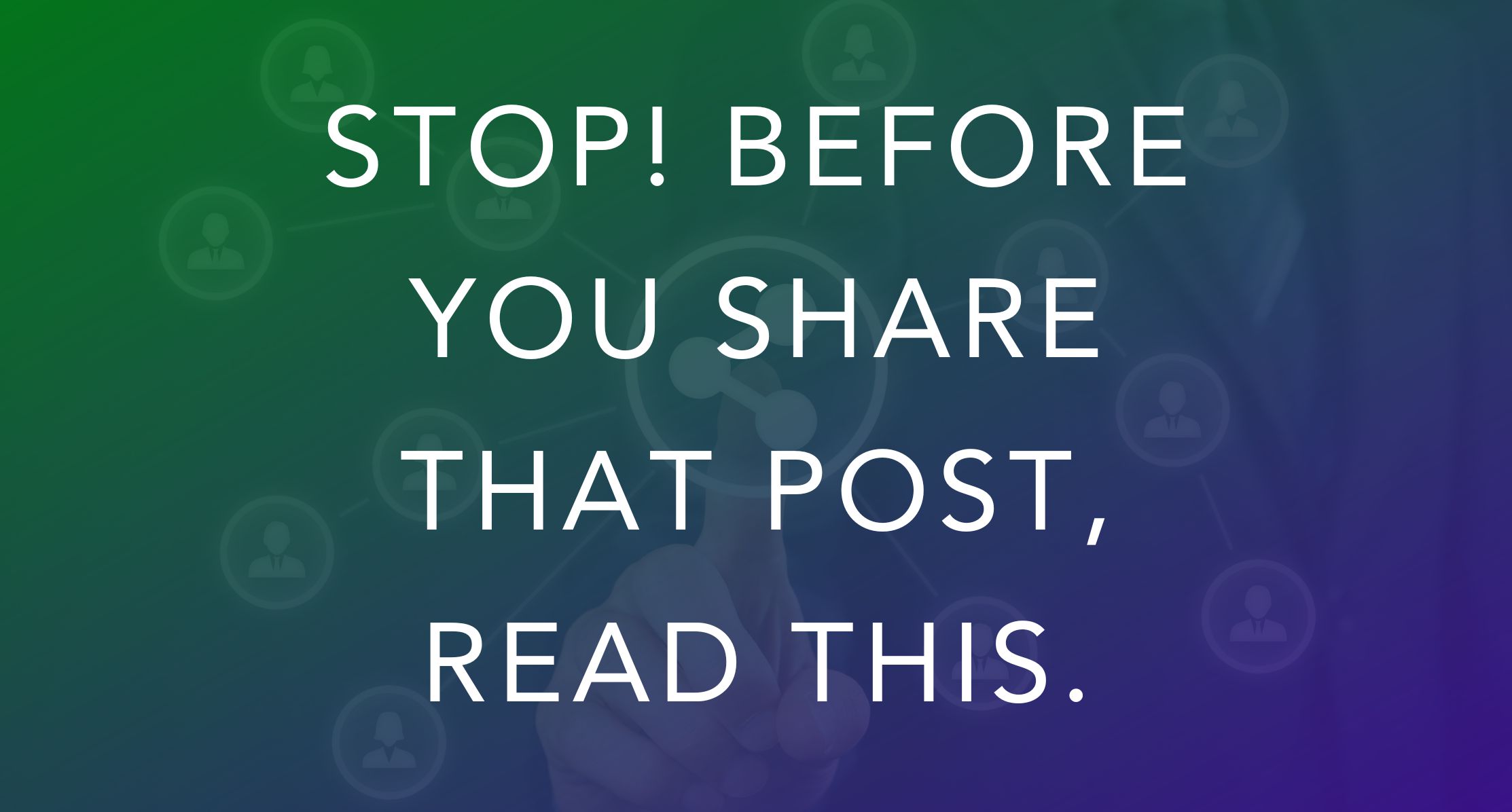It’s never been easier to share, bookmark, remix or highlight someone else’s content. In general, that’s a great thing, because elevating the content of people you love and admire is part of being a good online citizen. It’s also great for outbound engagement – yay!
But I gotta say, the way people share stuff around online all willy nilly would give my high school media literacy teacher a conniption. Especially now, where misinformation and disinformation are spreading like wildfire.
So, before you hit “share” or “retweet” or “add to stories”, here’s what to think about.
What are you trying to do here?
There’s no such thing as privacy online. People can see your likes, adds, follows, comments and shares. Basically, someone can see every action you take online. Even if you’re not actively posting or commenting about something, engaging with it can be enough to sway public opinion about your brand. Following a problematic fave? Liking something horrible because you want to go back to it later? Both of these can totally mean bad news for you – and no, saying that “retweets =/= endorsements” isn’t the get-out-of-jail card you hope it is.
When it comes to actually making and sharing posts, the stakes get higher. Remember that once something is on the internet, it can’t be undone. Even if you delete it, it can be screengrabbed or captured on the Wayback Machine. If you DM something, it can be screenshotted and shared.
Every time you engage online as your brand, think about what the cumulative impact of those actions is, and what it means for your brand identity – and reputation. Are you elevating positive things? Sharing valuable information? Calmly correcting misinformation? All of those things can be great, just so long as you’re thorough and strategic about what you’re sharing. On the other hand, if you’re sharing junk memes, rage bait and info that’s just plain wrong, you might actually end up undermining all the hard work you’ve put into your brand (or even end up in social media jail).
Before you hit “share”, here’s what to consider.
We no longer live in a world where information is written by journalists, fact checked by professionals, then signed off on by an editor. For better or worse (mostly worse), so much content these days is generated by regular schmos, meaning that being able to critically assess media is more important than ever.
On top of that, we’re all beholden to the algorithms, which means that people are deliberately creating the kind of stuff that drives attention and eyeballs – and that tends to be content that’s sensationalized, wild, wacky, or rage-inducing.
Before sharing, look for:
- Rage-baiting/misinformation-baiting. Is the account being deliberately antagonistic or deliberately using incorrect information (this could be as simple as saying there are 8 days in a week!) to elicit responses? If your immediate reaction is to rebut or argue whatever’s going on, take a beat to see whether you’re being baited into engaging.
- AI-generated material. We’ve been warned about deepfakes, but misinformation is getting easier and easier in the age of MidJourney and similar tech. There’s tons of political misinformation about there, so even if a pic or a breaking news item looks totally legit (and yes, even if it aligns with your personal beliefs), try to find it on a reputable source like a news channel or newspaper before sharing.
- Fake/bot accounts. At the time of writing this, AOC is warning about a fake Twitter account that is posing as her and releasing false policy statements. The account is gaining steam – because that’s what these things are designed to do. ALWAYS check the legitimacy of what you’re sharing, especially if it’s about news or politics, where astroturfing and propaganda are everywhere. This applies even if you’re interacting with the account of someone you know personally – because they might have fallen into the trap of re-sharing misinformation…so it’s on you to stop that cycle from continuing! (PS, protect your account with these tips!)
- Content with an agenda. Look, we all have an agenda. But some more than most. If you come across content with stats that impress you or a story that tugs at your heartstrings, take a minute to fact check by cross-referencing with legit sources before sharing (.edu and .gov sites are your friends!). And make sure you actually understand the stats, facts, and viewpoint being shown, because bad-faith actors can get very sneaky about how they present things!
- Parody/satire accounts. Okay, this isn’t misinformation as such, but oh boy have I seen some embarrassing cases where people take satire websites or parody accounts at face value. Before you pile on with the “well actuallys”, check whether you’re engaging with a known satirical website or poster first!
Vetted and verified what you want to repost? Confirmed that it’s on brand and aligned with your social media goals? You’re probably good to go! All that said: if you’ve got doubts? Just don’t do it, friend.
Need some help figuring out how reposting and resharing fits into your social media strategy? My Pulse Check service has you covered! Drop me a line, and let’s talk!

